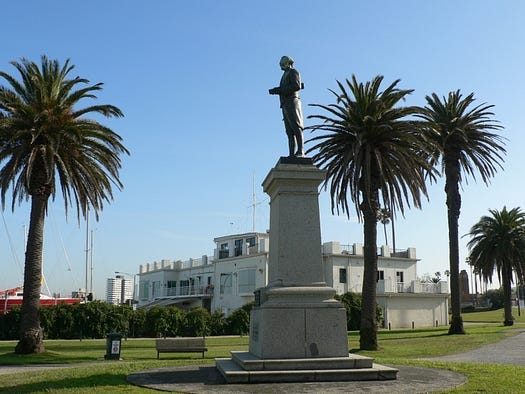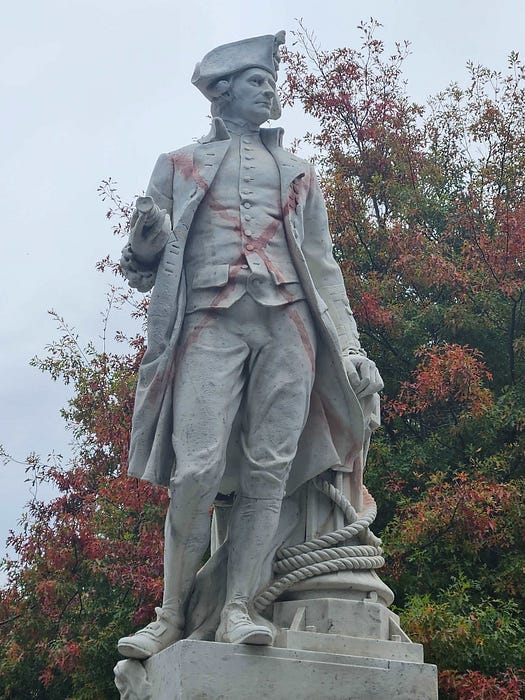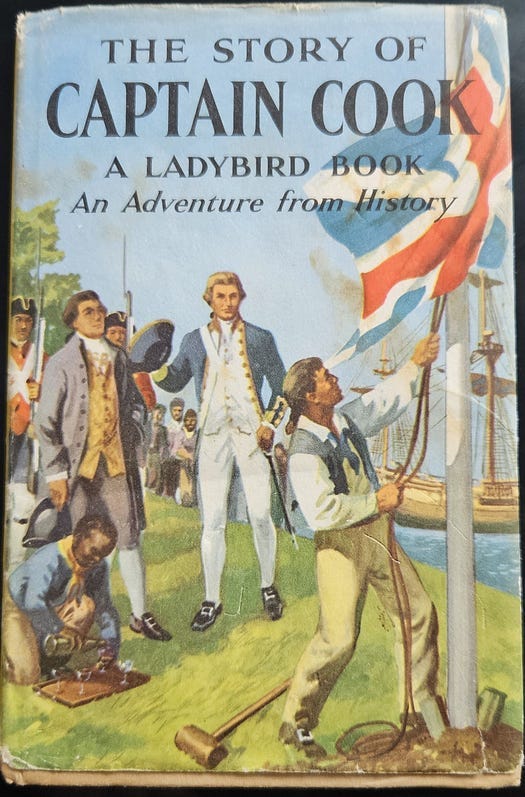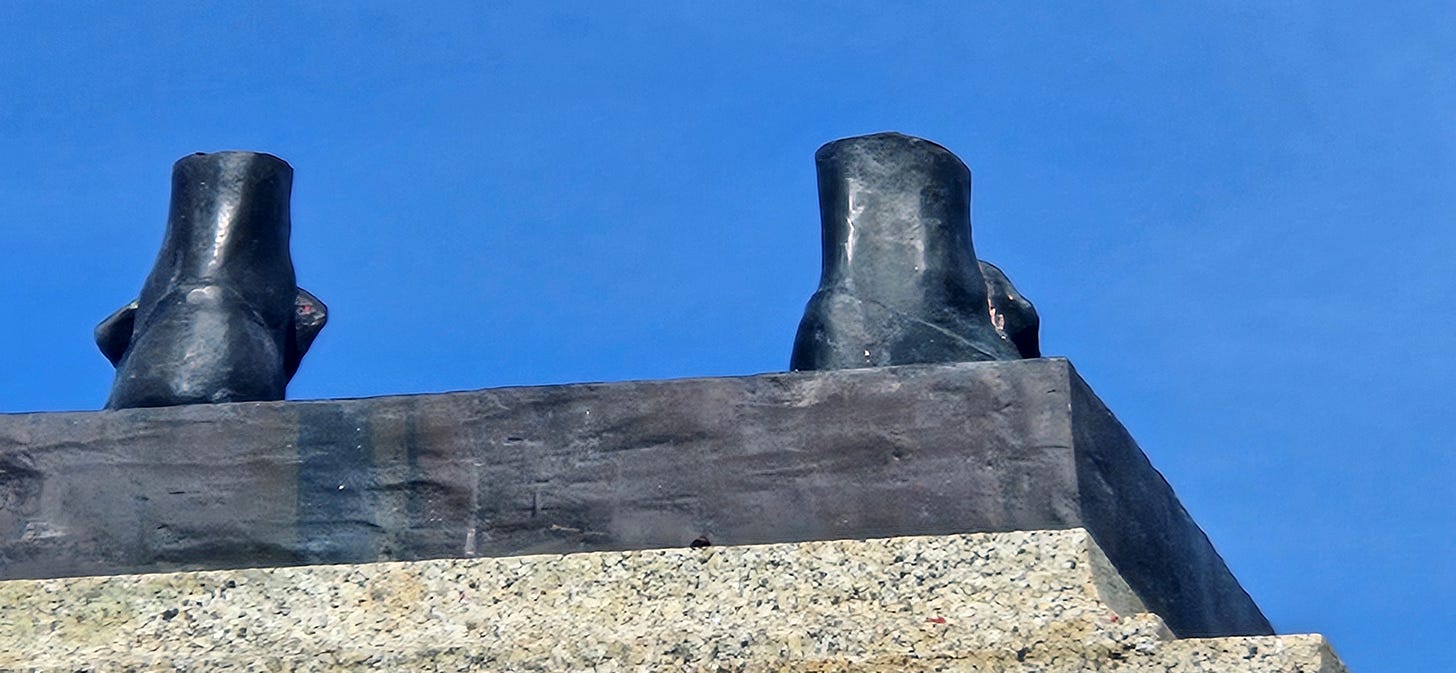January 26 approaches and the debate Australia Day and Invasion Day reignites. It is a worthy debate. Living in South Australia I have never thought the 26th was a meaningful National Day. SA never celebrated it until the Federal public holiday was mandated in the 1980s. So, let us have an adult debate, and focus on the celebration of the explorer James Cook. Cook is now under attack as the architect of colonialism and dispossession. On the 25th of January 2024, at St Kilda in Victoria, his life-size bronze statue was sawn off at the ankles and toppled. This was the eve of Australia Day, celebrating New South Wales's settlement by the British ‘First Fleet’. Counterviews of invasion and dispossession vex this national celebration of colonisation. The tension repeats yearly with culture warriors on both sides, but does Captain Cook deserve to be in the middle?
I was brought up celebrating Captain Cook. He was a great explorer who traversed the entire Southern Ocean and a great navigator who charted the South Island of New Zealand and the east coast of Australia. He was a great man who cared for his crew and approached new shores in friendship. The Ladybird's “Story of Captain Cook” was one of my earliest childhood readers, one of the few I kept for my children.
On the 22nd of August 1770, James Cook claimed possession of the entire eastern coast of “New Holland” by incongruously planting a flag on a small island near the northern tip of Cape York.[1] It almost seems like an afterthought, but it was a clear direction in his written orders from the Admiralty. Cook made his first landfall in April at Botany Bay, near Sydney. He raised a British flag at Botany Bay. He appears to have done the same at every stop northward but declared formal possession in August.
Does that make Cook the architect of Australian Colonisation? Taking ‘possession’ was the intent. Whether the British Government had any further intent is moot because a penal colony followed in 1788. That colony became New South Wales, claiming the eastern third of the continent, with Sydney as its center. The connection between Captain Cook and the colonisation of Australia is clear, although he died nine years before the colonists arrived.
The anti-colonisation sentiment is easy to understand. Colonisation resulted in most of the indigenous population dying of disease, the survivors being forcibly dispossessed, ruthlessly marginalised, then controlled and coerced under the guise of civilisation. I cannot think of any colonisation that did not involve invasion. Comparative power/technology determines the outcome of every colonisation.
Colonisation began with the first hominid emigration from the Rift Valley. Nature is the first to suffer the trauma of invasion, but it would also be naïve to think that each new wave of hominid emigrants did not compete for the choicest environments. In the 18th and 19th Centuries, the Age of Imperialism raised colonisation to an art form imbued with ceremony and formal rules of engagement. Still, it continues today with each land grab in Ukraine. To believe we are in a post-colonial era is wishful thinking. The difference is simply in the ceremony. Even in the Age of Empires, raising a flag was never enough, but now it is not even the first imperative. Boots on the ground, or boats on the South China Sea are the essential step.
Cancelling Captain Cook is not going to stop colonialism. Protesting at past colonialism can be construed as a critique of contemporary colonialism, but sawing Captain Cook at the ankles seems a facile action. It has symbolic value but does little to stop neo-colonialism or argue against the statement that colonialism is ancient, or posit a philosophy to prevent it in the future.
What is the cost of the symbolic sawing? Captain Cook is much more than a colonial symbol. What about celebrating Captain Cook the explorer? If the Admiralty had not ordered him to plant flags, would he be seen as the doyen of fearless explorers rather than the progenitor of colonial dispossession. His three voyages into the unknown are the equivalent of flying to Mars and back, with the 18th-century sailing ships a lot less likely to return.
I suspect that the arrival of future colonies was the last thing on Cook’s mind. What motivated him? He was a skilled seaman and, in his era, the only career offered to a boy of his station was on the sea. Why he chose ‘discovery’ over plying coal ships along the English coast is the question.
Renown, reward and remembrance are the principal motivations of most explorers. Restlessness and curiosity could be added but if you peruse any encyclopedia of explorers the vast majority of exponents are seeking fame and fortune. I cite Alan Reid’s “Discovery and Exploration — a Concise History” as evidence.[2] Of its 319 explorers, Darwin and Humboldt are the only examples of curiosity as a driver, but renown and regard were clear motivations even for them.
Exploration may be the least ‘selfless’ act on the planet, and Reid’s pages show that very little thought is given to the consequences of discovery. Perhaps there have been explorers who realised that trailblazing opened up exploitation and to avoid it they subsequently burnt their journals. Of course, this selfless action would ensure that they could not make it into Reid’s concise history.
I don’t think we are celebrating altruism in our explorers. In Australia, we celebrate endurance, resilience, bravery, and even incompetence. The biggest explorer memorial I have seen is a bronze statue of Robert Burke that can be found in Melbourne. In 1861, Burke led a huge expedition to reach the northern coastline, perishing with his companions at Cooper Creek because he had no experience with living off the land. Indeed, celebrating hardship and tragedy are recurring themes in our memorials including Captain Cook who was murdered in Hawaii.
It is impossible to stop Captain Cook from being chosen as a symbol of colonialism, but that is not why his statues were erected. Among many reasons for their erection, they celebrate humankind’s mastery over unknown oceans in the age of sail. The St Kilda statue, erected in 1914, had an even more specific rationale. It was a copy of the statue in his hometown, Whitby, erected two years earlier. At Whitby, the memorial celebrated the shipbuilding and seamanship of the town’s sons[3], and the St Kilda work followed the sentiment. It recorded the names of the crew of the HMS Endeavour — the seamen who made the journey possible. The journeymen explorers who manned the ropes and fed the horses, rarely figure in any commemoration. The Cook statue recognised a poor boy made good, born to the sea, in a community that valued sailors.
Choosing to see Cook as only a symbol of colonial oppression seems pusillanimous. When I reflect on the prospect of sailing off into unknown seas with no engines, few charts, sextant and compass, and limited provisions, I am prepared to recognize bravery to the point of recklessness. This is the connecting thread between the explorers in Reid’s history. Despite all the other shortcomings of explorers which include vainglory, greed, and a stubborn obtuseness, I am prepared to celebrate the effort. Celebrating indomitable spirit and recklessness is a thin line. When I see a statue of the ‘noble explorer’ I am curious to know their motivations and the motivations of the society which erected the memorial. What is being celebrated here? Why was it important to the culture that fashioned the pedestal? Cutting it off at the ankles never occurs to me.
Captain Cook is being returned to his pedestal at St Kilda. I hope the welds at his sawn ankles are visible because they will add another layer to the story of his celebration and how it has evolved over the generations. Memorials offer that benefit. They have a story that can change. Cancelling them loses that opportunity.

References
[1] Flood, J ‘The Original Australians’ Allen and Unwin 2019
[2] Reid A ‘Discovery and Exploration — a Concise History’ Gentry Book, London 1980
[3] Statue to Cook at West Cliff, Whitby, Yorkshire, UK https://www.captaincooksociety.com/remembering-cook/memorials/countries-with-cook-memorials/statue-to-cook-at-west-cliff-whitby-yorkshire-uk




